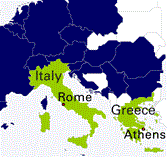- BY Free Movement

3rd country cases
THANKS FOR READING
Older content is locked

A great deal of time and effort goes into producing the information on Free Movement, become a member of Free Movement to get unlimited access to all articles, and much, much more
TAKE FREE MOVEMENT FURTHER
By becoming a member of Free Movement, you not only support the hard-work that goes into maintaining the website, but get access to premium features;
- Single login for personal use
- FREE downloads of Free Movement ebooks
- Access to all Free Movement blog content
- Access to all our online training materials
- Access to our busy forums
- Downloadable CPD certificates
 There were developments last week in the world of third country removal cases, and now seems like a good moment to review the current position.
There were developments last week in the world of third country removal cases, and now seems like a good moment to review the current position.
The Dublin II Regulation (not its official title) enables EU states to return an asylum seeker to the country through which the asylum seeker first entered the EU. There are certain qualifications to that power, both legally and practically, but that is the nub of it. The Asylum and Immigration (Treatment of Claimants etc) Act 2004 established binding legal presumptions that removal to EU states cannot breach Article 3 ECHR.
In the case of TI v United Kingdom [2000] INLR 211 the European Court of Human Rights held that Dublin II did not absolve the United Kingdom from responsibility to ensure that a decision to expel an asylum seeker to another Member State did not expose that asylum seeker, at one remove, to treatment contrary to article 3 of the Convention. This is the concept of refoulement, to which there is no direct English language equivalent. My French is terrible, but I’m told its meaning is equivalent to ‘return, whether directly or indirectly’.
Last year the House of Lords heard and rejected the case of Nasseri [2009] UKHL 23. The claim was by an Afghan national who was to be returned to Greece under Dublin II. Mr Nasseri claimed that if he was returned to Greece that would amount to a breach of Article 3 ECHR because it would be unlawful refoulement to Afghanistan, as the Greeks would not properly consider his claim and would just send him packing. There was considerable evidence to show that the Greek ability to assess asylum and human rights claims was a shambles and cases were automatically rejected after an absence from the country of three months, which would almost always be the case after a Dublin II return.
The claim succeeded in the High Court but failed in the Court of Appeal and also in the Lords. It was accepted that Greek asylum status determination was a joke (I paraphrase, but only slightly) but there was no evidence that Greece actually removed anyone anywhere, so there was no risk of refoulement in practice. It was explicitly left open for a future case to succeed on the basis that there was an actual risk of refoulement – but the evidence would need to be compelling.
The most recent third country case was in relation to Italy. This was R (on the application of EW) v Secretary of State for the Home Department [2009] EWHC 2957 (Admin), in which it was argued that the treatment of asylum seekers in Italy was so appalling that return under Dublin II to Italy would lead to a breach of Article 3 in Italy itself. The claim was comprehensively dismissed on the grounds that failure to provide reception facilities did not even engage Article 3 as it was not ‘treatment’ and even if it did the conditions did not pass the threshold for ‘inhuman or degrading’. For good measure it was added that there is a presumption that states comply with their international obligations (para 111). The Court of Appeal refused permission to appeal rather comprehensively last week.
I stand to be corrected, but it seems that the current position is that if there is bloody good evidence that a Dublin II destination state is failing to assess protection needs and then is actually removing people to their home countries, a successful challenge could be mounted to a Dublin II removal notwithstanding the statutory presumptions. Similarly, if there was bloody good evidence that there was active ‘treatment’ of Dublin removees in Italy or elsewhere that crossed the inhuman and degrading threshold (widespread police beatings or similar) then an Article 3 claim could succeed. But as things stand, despite the efforts of some seriously talented and dedicated lawyers, that evidence does not currently exist.
The 2004 Act is therefore potentially but not actually at the current time incompatible with Article 3 ECHR. As Lord Justice Laws commented in Nasseri in the Court of Appeal, that makes the UK’s compliance with its human rights obligations very fragile.
SHARE


3 responses
refoulement means to expel or repress (according to Google translate)